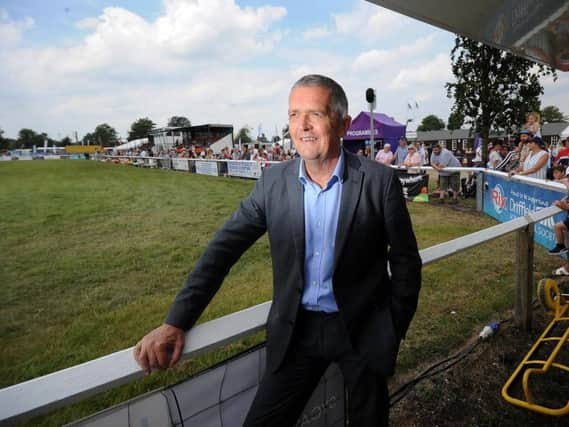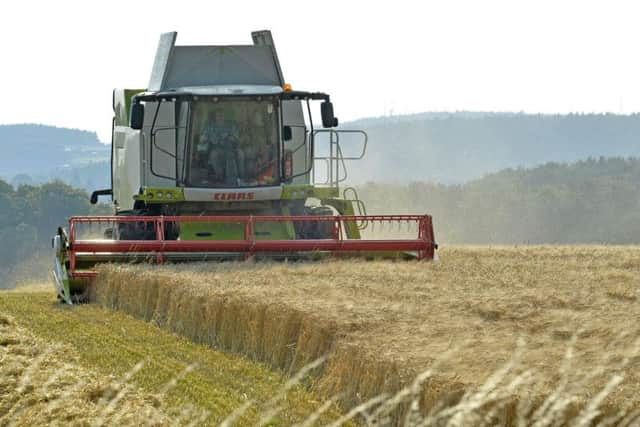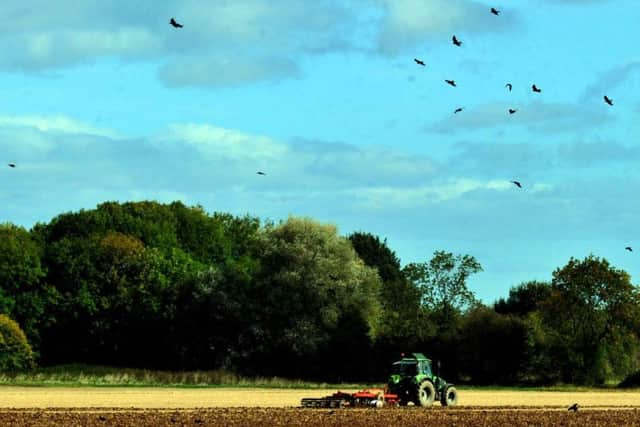Funding void would damage farmers' access to tech in climate battle, union chief Guy Smith says
This article contains affiliate links. We may earn a small commission on items purchased through this article, but that does not affect our editorial judgement.


Advertisement
Hide AdAdvertisement
Hide Ad

Essex-based farmer Guy Smith told The Yorkshire Post at this week’s 144th Driffield Show that he was concerned that a focus on ‘no-deal’ Brexit planning within government was getting in the way of a detailed plan for driving investment on farms beyond 2020.
The industry leader acknowledged that agriculture was on the brink of a “fourth revolution”, with GPS, steering and camera technology, among other innovations, available but still too costly for widespread take-up.
He welcomed a report by the RSA Food, Farming and Countryside Commission, published this week, which calls for the nation to transition to organic farming, integrated pest management, pasture-fed livestock, conservation agriculture and agroforestry, among other ‘agro-ecology’ farming methods, by 2030.
Advertisement
Hide AdAdvertisement
Hide AdFailing to do so will mean further climate breakdown and more diet-induced ill-health, the independent commission said at the end of a two-year inquiry.


However, Mr Smith warned that the Government has to be clearer about how farmers will be supported to make changes to their businesses, while protecting the UK’s ability to feed itself as the population continues to grow.
“The one big challenge facing humanity globally at the moment is how we feed an exponentially increasing population but don’t increase our carbon footprint. That is a fundamental challenge and one we have got in Britain,” the union officeholder said.
“It’s going to involve the best technology and a lot of investment in our farms, but I’m conscious that if there isn’t a big margin or return in agriculture at the moment, how are farmers going to make that investment?
Advertisement
Hide AdAdvertisement
Hide Ad“If you look around the (Driffield) Show, you can see what is talked about as the great fourth agricultural revolution with technology at the forefront... but all this fancy kit, it’s not cheap. We need to have a profitable business to reinvest back in and government needs to think about that.”
'Don't off-shore food production'
Mr Smith said the nation has to strive for more sustainable ways of farming itself, rather than meeting climate breakdown targets by off-shoring production.
“Farmers are up for the challenge, and although we are committed to the aspiration of net zero (emissions) by 2040, we are quite clear that shouldn’t be done by simply off-shoring agricultural production to other parts of the world, that’s the easy way to do it but that’s not a sustainable solution.
“We need to keep on producing food in this country but we need to do it in a more sustainable way and if it involves more trees on farms in discreet places, where we are not impacting on our ability to produce, and if it involves new ideas, farmers are not stuck in our ways... but let’s not be starry-eyed about it, it’s going to involve a lot of technology, investment, thought and challenge.”
Current grant scheme 'not enough'
Advertisement
Hide AdAdvertisement
Hide AdThe Department for Environment, Food and Rural Affairs (Defra) is currently inviting farmers to apply for a share of £15m, until September 3, through its Countryside Productivity Small Grants scheme. The long-awaited second round of the scheme’s funding came with a pledge of another £15m round of the scheme next year.
Mr Smith said farmers had shown interest in the scheme but they must be led by a cohesive longer-term strategy that ensures farm investment continues.
“Our challenge to government is at the end of this round, where are we going? Because at the moment we can’t see any clear proposals about what small or large productivity grant schemes or RDPE (Rural Development Programme for England) type schemes there are going to be.
“We are looking at a bit of a void so we are looking at government now to be thinking about what these schemes might look like, how they can help farmers meet these challenges of keeping food production where it is but reducing our carbon footprint.”
Advertisement
Hide AdAdvertisement
Hide AdMr Smith added: “There is a role for government here but they are a bit distracted by Brexit, understandably, but we must get everyone to focus their minds on what the world’s going to look like next year and the year after.
“If we aren’t planning for the year after next, we aren’t really planning. They are all ‘no-deal’ planning in Defra and I can understand why because food supplies are very important, but we need to start thinking forward a bit now because 2021 is only round the corner.”
Defra's plan
Environment Secretary Michael Gove championed the need for change to better serve the environment in a speech at Kew Gardens this week.
He said Defra had shown EU policy can be replaced with “a more enlightened approach towards the environment”, saying the Agriculture Bill will reward farmers with public money for “public goods” so they are supported to deliver environmental improvements.
Advertisement
Hide AdAdvertisement
Hide AdFull roll-out of the public goods model, via an Environmental Land Management Scheme, is not planned to be complete until 2027 however.